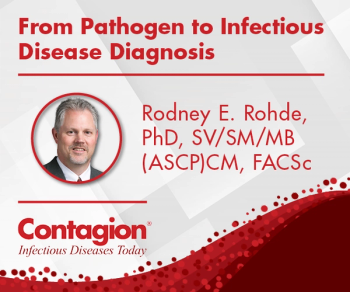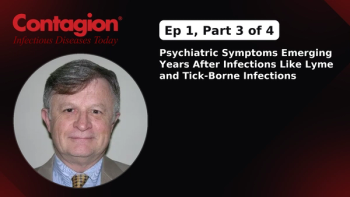
John Rex, MD, FACP, discusses the promise, precision, and challenges of this first-in-class antifungal following phase 2b trial results.

John Rex, MD, FACP, discusses the promise, precision, and challenges of this first-in-class antifungal following phase 2b trial results.

Paul Feuerstadt, MD, FACG, AGAF, offers a glimpse of patients dealing with this and insights on improving patients’ quality of life, post-treatment with fecal microbiota, live-jslm (Rebyota [RBL]).

Rodney Rohde, PhD, SM(ASCP), SVCM, MBCM, FACSc, discusses the ongoing concerns about the federal government’s hold on funding for research and the potential chilling effect that it may have on laboratory professionals and deciding on careers, especially in areas such as public health. He also talks about locating and engaging in potential alternative resources for research funding.

In our latest podcast, Tim Gauthier, PharmD, BCPS, BCIDP, discusses all things pathogens and antibiotics. He also details the opportunities presented for antimicrobial stewardship when it combines diagnostics and treatment duration.

In a wide-ranging interview, Susan Weiss, PhD, talks about winning the ASM Lifetime Achievement award, her work on coronaviruses, and her concerns around federal government funding and how it may shake up and limit basic science research.

At the ASM Microbe conference, Mike Bromley, PhD, offers some insights on the importance of a One Health approach addressing the growing antifungal resistance to azoles and Aspergillus fumigatus because of the connection between crop spraying and the rise of resistance.

Ep 1, Part 3 of 4 with Robert Bransfield, MD, explores treatment-resistant mental health issues linked to infection history and diverse progression patterns.

Jatin Vyas, PhD, MD, offers some insights into the economics of development, the biology of fungal species, and the difficulties behind creating new antifungal molecules.

Presented at MAD-ID 2025, Natt Patimavirujh, PharmD, supports fidaxomicin over vancomycin for high-risk groups, including transplant and chemotherapy patients.

Andrew Handel, MD, discusses prevention, how to remove ticks, and the burden of Lyme disease in certain populations.

Presented at MAD-ID by Mohammed Al Musawa, PharmD, BCIDP, the study found lower clinical success with imipenem-cilastatin-relebactam in obese patients, raising questions about dosing strategies.

At MAD-ID, Alyssa Cox, PharmD, showed fidaxomicin reduces 90-day recurrence by 68.3% versus vancomycin, with rates of 7.9% vs. 19% in 176 hospitalized patients.

At MAD-ID, Jose Alexander, MD, reports 98% susceptibility in ESBL E coli and 76% in K pneumoniae, underscoring the need for species-specific testing.

At MAD-ID 2025, Tiffany Lee, PharmD, presents multi-center findings showing no increase in AKI with higher initial dosing.

At MAD-ID 2025, William R Mikesell, PharmD, presented data showing 20% vs 16% treatment failure rates in doxycycline and minocycline groups.

Christina Lee, PharmD, and Julia Donahue, PharmD, analyzed 533 encounters revealing a 27.1% readmission rate in immunocompromised patients versus 14.1% in non-immunocompromised patients.

At MAD-ID, Dianne Nguyen, MD, shares Phase 3 data showing consistent tolerability of the microbiome therapy across high-risk patient populations

In a new study presented at MAD-ID, omadacycline was found to have an 86% clinical success rate across a wide-range of infections and pathogens in an immunocompromised population.

At MAD-ID, Marc Scheetz, PharmD, discusses how PK/PD modeling and AUC-based strategies offer safer, more precise antibiotic therapy.

Logan Brock, PharmD, presents data at MAD-ID, showing limited diagnostic yield from routine fungal cultures and delayed results compared with standard methods.

After the leaders of the NIH, FDA, and HHS made an announcement stating that both pregnant women and children were going to be taken off the COVID-19 immunization schedule, they decided to offer a new designation for the latter group, making it a shared decision between providers and patients.

At MAD-ID 2025, Kimberly Leuthner, PharmD, FIDSA, highlights the need for larger prospective studies amid limited current evidence.

At MAD-ID 2025, Jiye Park, PharmD, presents findings showing once-daily dosing is effective, with no added benefit from extended vancomycin use after antibiotics.

At MAD-ID 2025, Dakota Rorie, PharmD, highlights cost and access barriers to uptake of preferred CDI therapy.

At MAD-ID 2025, Rachel M. Kenney, PharmD, discusses treatment shifts, microbiome innovations, and pharmacists' roles in optimizing outcomes.

Timmy Do, PharmD, BCIDP, BCPS, presents case series at MAD-ID 2025 on investigational therapies following tecovirimat failure.

At MAD-ID 2025, Cadhan McFadden presents data from a multidisciplinary ambulatory care project using PEN-FAST scoring and oral challenges to improve antibiotic access and accuracy.

At MAD-ID 2025, Elizabeth Dodds Ashley, PharmD, MHS, explains how NHSN’s Antibiotic Resistance Option is shaping stewardship and clinical decision-making.

At MAD-ID, a study highlights how prescribing in these settings suggests a need for antimicrobial stewardship efforts.

At MAD-ID, Timothy Aungst, PharmD, outlines the role of artificial intelligence in clinical decision-making, curriculum design, and infectious disease practice.